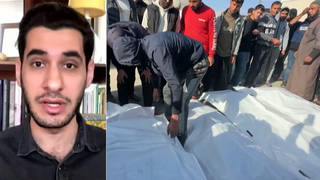
Palestinian poet Ahmed Abu Artema was seriously injured in an Israeli airstrike on October 24 that also killed five members of his family, including his 12-year-old son. Artema helped inspire the Great March of Return, a series of nonviolent protests in Gaza starting in 2018 when thousands of Palestinians marched to the militarized fence separating them from their ancestral homes inside Israel, braving deadly Israeli sniper fire that killed hundreds and injured thousands more. Artema spoke with Democracy Now! about the mass protests in 2019. “The Palestinians in Gaza are actually in a real prison,” he said. “When tens of thousands of Palestinians share in the March of Return, they want to say that we never gave up our right to return.”
Transcript
AMY GOODMAN: This is Democracy Now!, democracynow.org. I’m Amy Goodman.
We turn now to an update on a past guest who appeared on Democracy Now! An Israeli airstrike has killed five members of his family. That’s the family of the Gazan poet, journalist and peace activist Ahmed Abu Artema, who survived the blast but was seriously injured. The dead include his 12-year-old son. He helped inspire the Great March of Return, a series of weekly nonviolent protests in Gaza that began in 2018. Israel responded to the protests by killing over 200 protesters, including 46 children.
Artema recently wrote an article for The Nation magazine headlined “Gaza Is Being Killed. We Desperately Need Your Help.” Artema wrote, quote, “Israel sent us a very clear message when it responded to our peaceful protest with such bloodshed: It doesn’t matter if you attempt to achieve your demands nonviolently. We will kill you and deny you your rights regardless,” he wrote.
In 2019, I interviewed him in our studio here in New York.
AHMED ABU ARTEMA: When I and some of my friends invited to the March of Return, a lot of people answered this call, because it was a scream for life. It expressed the will of life in our hearts, Palestinians’. The Palestinians in Gaza are actually in a real prison. They live in a real prison. And they are without any of the basic conditions of the human life. And before that, 75% of the Palestinians inside Gaza, they are refugees. That means their origin villages and towns are beyond the fence, the Israeli fence. So, when tens of thousands of Palestinians share in the March of Return, they want to say that we never gave up our right to return. This is our normal right, and this right based on the United Nations Resolution 194.
And from other side, they wanted to say that we want life and nothing but life. We are actually here inside Gaza prison. We are dying. We are dying because of no medicine, no food, no work, no jobs, no factories. Hundreds of factories were destroyed in the last 10 years by Israeli attacks. So, these people search of hope. They want hope. They want dignified life. The March of Return is a scream of life. It’s a knock on the door. When there is a person inside a prison without food, without medicine, then he hasn’t any choice but to knock the door, to try to escape towards the life. This is exactly what the Palestinians made in Gaza. They said to Israel, our will of life is stronger than despair. So we continue. We want to struggle. And we struggle for life. We struggle for humanity. We struggle for justice.
AMY GOODMAN: And so people are protesting. They’re engaging in this weekly mass protest. And you’ve been met by massive response of the Israeli military.
AHMED ABU ARTEMA: Yeah.
AMY GOODMAN: Talk about what happens in these Friday protests around the fence.
AHMED ABU ARTEMA: Yeah, yeah. Some people asked me, and some journalists asked me, “Why the Palestinians continue their protesting despite the high — the high price of victims and injured people?” I answer them, the Palestinians are continuing their protesting, because this is their only choice. They haven’t other choices. They try to escape towards the life. So, the people — when the people shared in the March of Return, in this protest, they came near the fence that separated them from their villages and cities, and the people collect peacefully.
AMY GOODMAN: That was the Gazan poet, journalist and peace activist Ahmed Abu Artema, speaking on Democracy Now! in 2019. An Israeli airstrike has killed five members of his family. He was seriously injured.
Coming up, we’ll speak to an Israeli man who helped negotiate a prisoner swap with Hamas in 2011 that freed the Israeli soldier Gilad Shalit after five years, in exchange for the freedom of more than 1,000 Palestinian prisoners. Back in a minute.












Media Options